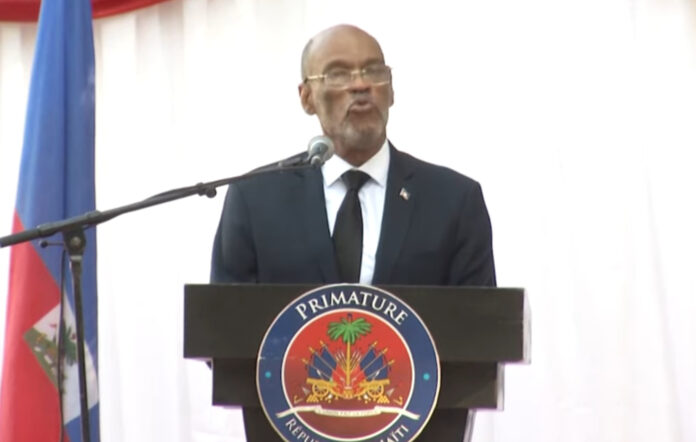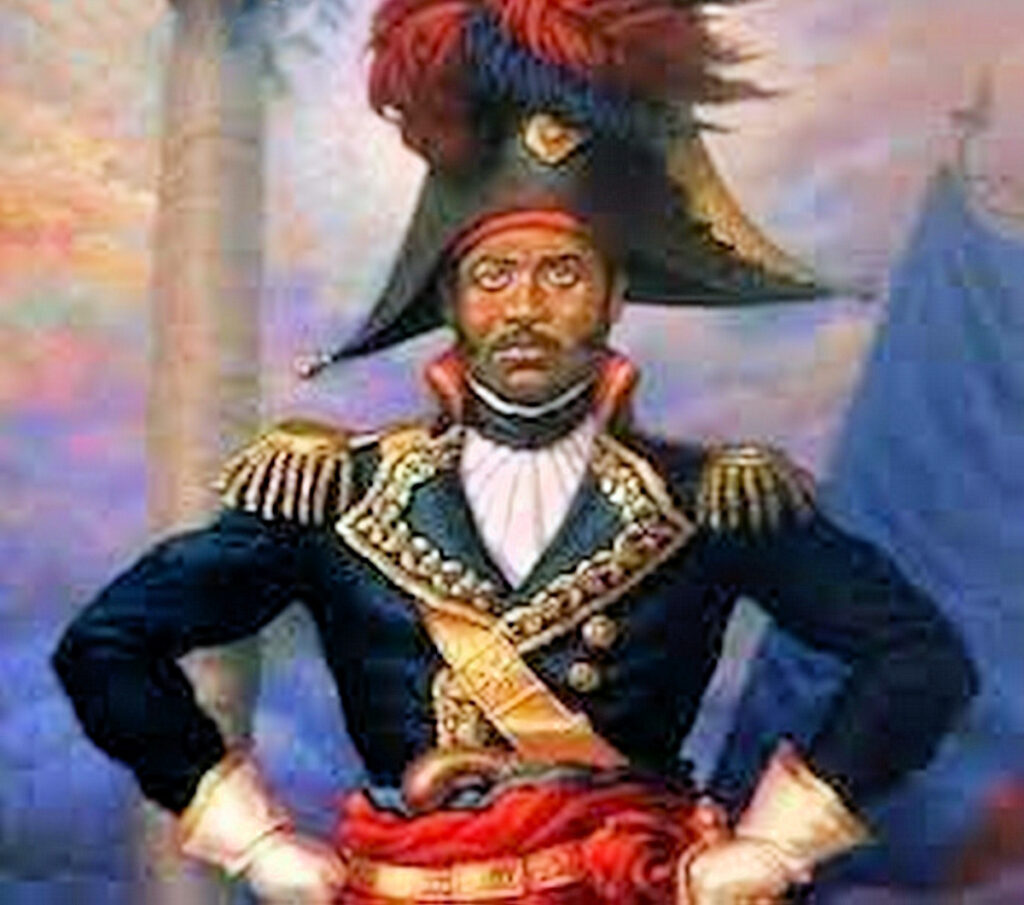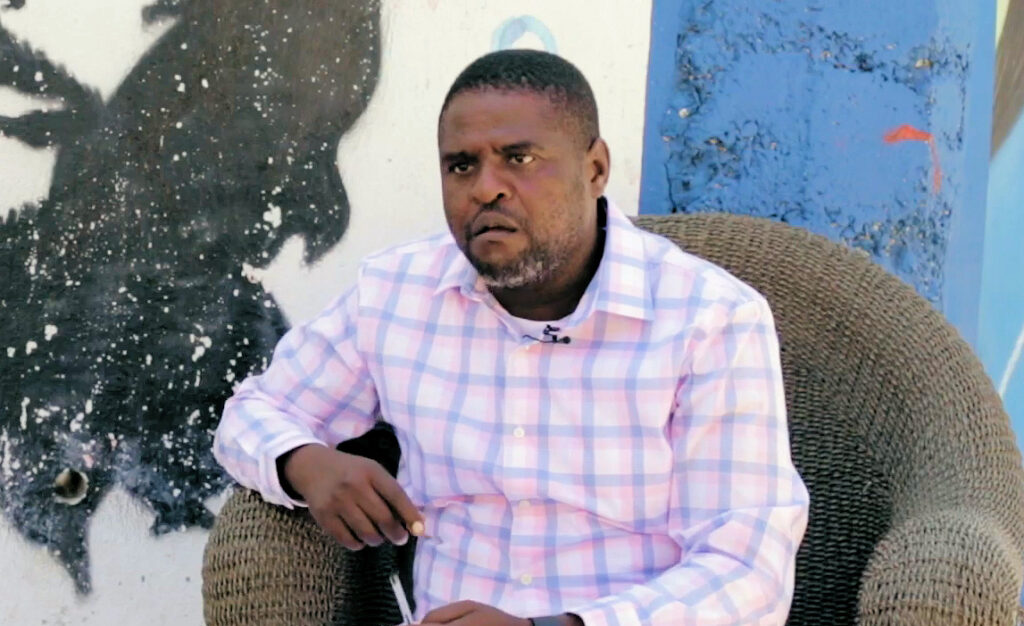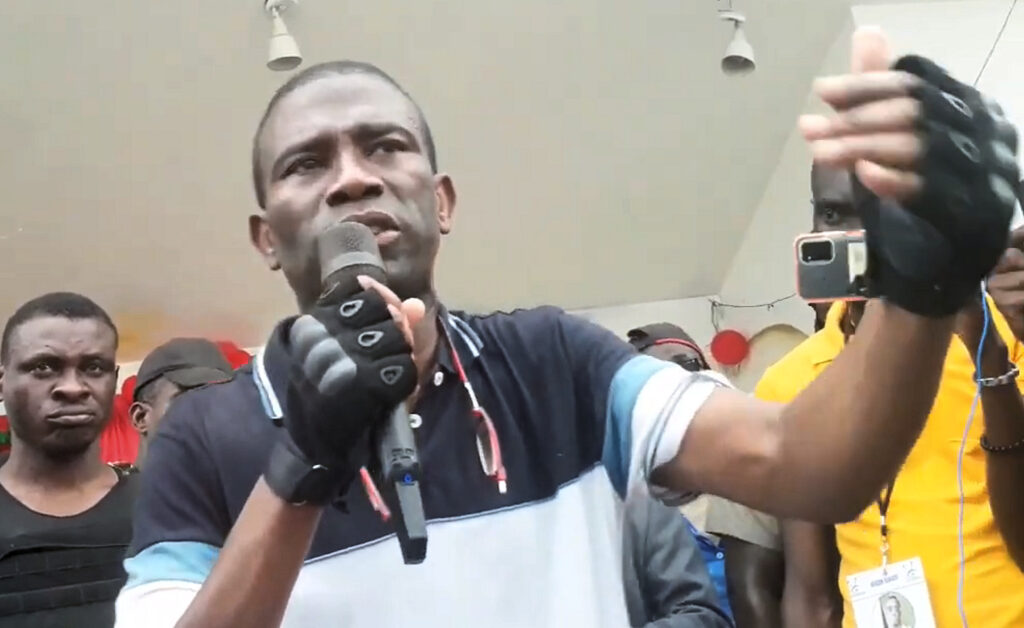
General-turned-Emperor Jean-Jacques Dessalines announced Haiti’s independence on Jan. 1, 1804 in the northwestern city of Gonaïves.
“We must finally live independently or die,” he declared. “Let us swear to the entire universe, to posterity, to ourselves, to renounce France forever and to die rather than live under its domination; to fight until the last breath for the Independence of our country.”
Two-hundred and twenty years later, Haiti is facing one of the biggest tests of that independence promise. The U.S., with support from France and Canada – the nation’s three principal neo-colonial overseers – have used the UN Security Council to deputize a Kenyan force of 1,000 police officers to lead a military occupation of Haiti and battle the criminal and anti-crime armed groups which have emerged across the country in the face of the Haitian state’s collapse. Haiti’s police force is discouraged, lacking troops, training, weapons, ammunition, vehicles, and gas.

Washington’s end goal is to install a 10-year U.S. military presence in Haiti under the aegis of the “Global Fragility Act,” but it needs to get in place a nominally elected puppet government to do the inviting. Facilitating that demonstration election is the role being delegated to the Kenyans and a handful of other handmaiden nations that will make up the Multinational Security Support mission (MSS). It is blessed but not governed by the UNSC. But the mission’s fate remains uncertain as it is still in the hands of the Kenyan Supreme Court, which has said it will decide by the end of January whether the Kenyan police can legally deploy to Haiti.
Ariel Henry Doubles Down on Governing through the “Transition”
By tradition, the Haitian head of state makes a speech in Gonaïves on Jan. 1, but Haiti only has a de facto head of government, Dr. Ariel Henry, who deemed it too dangerous to travel to that city, especially when recently repatriated former soldier, policeman, Senator-elect, and “rebel” leader Guy Philippe was speaking there, launching a nationwide revolutionary uprising against Henry.
With multiple units of the Haitian police and army standing in formation, Henry instead made a speech at the Museum of the Haitian National Pantheon (MUPANAH) in Port-au-Prince’s central Champ de Mars square.
“In 2024, Abraham says that it’s enough,” he said, effectively recognizing that Haitians are fed up with his government. “It is for everyone to see that Haiti has decided to really take the path of change. 2024 is the year for the work team for change to take off, without looking back.”
Such platitudes fell flat, however, when he reiterated the same themes found in all his speeches, like “2024 must be a year of national reconciliation and assembly of the Haitian family around a common project.”
The only project around which most of the political class and masses have united is that Henry must leave power by Feb. 7, the traditional date – since Jean-Claude “Baby Doc” Duvalier fled Haiti on that day in 1986 – for administrations to change. The latest coalition to adopt this goal is the “United Front for an Effective and Durable Exit from the Crisis,” formed in late October and comprising many of Haiti’s oldest and largest parties. Such rivals have been negotiating power sharing with Henry for two and a half year with no progress at all.
Henry continues to double-down on his intransigence and blame all of Haiti’s trouble on the “gang violence” that his rule has engendered.
“In order to change the country, everyone must respect the rules of the game,” he said. “In order for us to reach our goals, you must displace small groups of people who have decided to use weapons to terrorize the population, kill people for nothing, kidnap people, rape women, prevent Haitians from moving freely on this land our ancestors fought to leave us. The monopoly of legitimate use of force must remain in the hands of the State. We can’t let men with guns make people believe that they can replace the State or put in their heads that they are the ones making the law. The show we are giving today is not good at all. I understand you are tired of criminals. I understand that you are tired of the acts of bandits. I understand that we would like it to change and for it to change quickly. But we can’t do it just any way. We will not find solutions to these problems if we continue to weaken the State.”
As for coalitions with opposition parties: “Since Jamaica I have promised to expand the HCT [High Council for the Transition, the name of his governing coalition], to have more political sectors join the government, to start the constitution revision process, to launch the electoral process. For more than two years, we have done everything we could to bring everyone to the table. We decided to move forward with the willing actors. The others will join us on the way.”
Jimmy “Barbecue” Cherizier Tries to Raise “Armed Group” Consciousness
But five days before, on Dec. 27, Jimmy “Barbecue” Cherizier, who has remained relatively quiet in recent months, issued a voice message to the nation which presaged Henry’s speech.
The leader of the G9 Family and Allies anti-crime neighborhood alliance mostly addressed the other armed groups in the country with whom he had tried to form a peace pact and coalition called “Viv Ansanm” (Live Together) in September.

“Instead of taking all those guns that are in the ghettos, that the oligarchs, politicians, the state, and sellers of the country put in the ghettoes for us to fight among ourselves and kill each other, we should take those arms and use them against our true enemy,” he said, referring to the Haitian bourgeoisie. “Just as we announced ‘Live together,’ a fight broke out among us. One began to fight with the other.”
He noted that this gave Ariel Henry the opportunity to say: “Bandits cannot live together or unite.”
“Gentlemen,” Cherizier continued, “we proved that we are bandits, that we can’t live together or unite,” essentially acknowledging that he had been unsuccessful so far in reforming and then uniting with the criminal gangs against whom he has been fighting for years.
“Why do I say this? Those guys take all the problems the nation has, and they put it on the armed groups. As if those of us with arms are the ones responsible for making schools, hospitals, putting security, reinforcing the police and the army, as if those are things we should be doing. They blame everything on us.”
“We are the ones who stole the PetroCaribe and CIRH [post-2010-earthquake Interim Commission to Reconstruct Haiti] money,” he added facetiously.
Cherizier noted how the police provide “no armored cars to give the people security, but there are police to guard the businesses of the fat cats. There are police to guard their merchandise.”
“Therefore, let us who are armed become conscious, let’s look for people who have the same ideology as we do, who are like us, who want the country to change, who are not greedy thieves…
“Let’s become conscious, to unite, to see that this country cannot continue the way it is going, and let’s reconcile, let’s forget what’s happened in the past, let’s figure out how we can get together to fight those thieves, those who are the real problem for the country… Let’s unite to give Haiti a second independence and struggle to lift the nation out of where it is, so that people who look like us stop dying and being victims. That should cause our conscience to revolt. Let’s turn our guns on the true enemy. Let’s put ourselves with people who have the same ideology, who see Haiti and not their pockets. Let’s get together with them and see what we can do to liberate this country.”
Guy Philippe Stresses that Foreigners Have Caused Haiti’s Problems
The next day, Dec. 28, a similar message came from Guy Philippe during a speech to a large crowd in Petit Goâve.
“Today I come to tell you one thing: Things are going to change,” Philippe began. “What we see in Haiti today is something that started in 1806, when these guys decided to assassinate all the dreams of a people [when the emerging Haitian bourgeoisie murdered Jean-Jacques Dessalines on Oct. 17]. And every time the people make an effort, they push them down so they can’t advance.”
Referring to the U.S., France, and Canada, Philippe continued: “The foreigners are responsible for our situation. The embassies are responsible for Haiti being in the state it is today. They want us to pay for 1804 for all time. We have to stand up and say: that’s enough.
“As Faustin Soulouque [Haiti’s ruler from 1847-1859] said when they threatened to bomb him: ‘To force, I will respond with force’. Today we have an even greater force; it is our will as human beings, it is our will as a people to make the foreigners understand that we are tired of being their slaves. To tell all the thieves in Port-au-Prince that we are tired of seeing all the ministers, general directors, prime ministers get rich, in two weeks they become millionaires while the our people are mired in poverty. They are also responsible for a lot of the young men and women taking up arms and killing…”

Then he made a direct reference to Cherizier, whose message over the past four years Philippe seems to echo.
“Today I say to the young people of Martissant and Mariani: stop punishing our own people, people like you who are enduring poverty, who are victims of the system. Listen to what Commander Jimmy Cherizier says: put down your weapons. Too many tears have been shed… We will change that with the people. I say to you: in 90 days we could have a beautiful Haiti which is flourishing… Stop killing people. Help them instead. Put down your weapons. Because the people are suffering too much.
“We are asking them to do that as brothers. But if they don’t, we will have to force them to do that.
“The foreigners and their embassies are destroying the country. They have a plan. Today, they tell you that the Haitian National Police are no good. Now they say that they are going to come with […] Kenyan soldiers… to come fight with the gangs. That’s a lie. As a people, we should not accept that or allow Ariel Henry to accept that. Who gave him that power?
“It’s the embassies who want insecurity. Why? So they can steal land, and what is under the land. They want insecurity so the Kenyans come here, so they hold power for life while they plunder the country,” he said.
Then for the first time, Philippe seemed to obliquely apologize for the role he played in helping to overthrow Aristide in the early 2000s.
“Let’s put aside our differences. Let’s put aside whether we are Lavalas, or Duvalierists, or GNBists [people who supported the 2004 coup]. We have to come together as one. When they have to crush us, abuse us, kill us, they put us all together. When they have to keep us down, they work it out among themselves.”
Philippe made a not-so-veiled reference to his leadership of the armed rebels who attacked Aristide’s government from 2001 to 2004. “OK, we were mad. At a certain point, we were engaged in battle. But now, let’s stop fighting among each other. Let’s work things out. Let’s unite to finish with poverty and insecurity. It’s poverty which creates insecurity.”
Referring to the criminal gang leaders he said, “we can neutralize Izo, Ti Lapli, Vitelhomme, but as long as we don’t neutralize the thieves in the big offices, the thieves with ties, everything will repeat itself.”
He also addressed the foreign non-governmental organizations that are heavily deployed in Haiti. “We don’t hate foreigners. We’ll need the aid of foreigners. But we as Haitians have our own interests… All those NGOs mushrooming around the country, we have to tell them where to invest…. If they want to help us, we should tell them how we want the aid.
“We can’t have CARICOM and others saying who should govern us. This time it’s us Haitians who will decide who is going to govern Haiti.”
Philippe talked about putting the Brigade for Surveillance of Protected Areas (BSAP, now a militia of about 15,000 nationwide), the Army, and the Haitian National Police all together.
“We have to restart agriculture,” he said, blaming its decline on the Haitian bourgeoisie. “The vagabonds just import, import, import,” he continued. “They’ve destroyed our national [agricultural] production. We’re fighting for the country to live on what it produces… for us to live like people, with dignity. We don’t have to be rich or millionaires, but we want to live like people.”
“The Haitian people’s destiny is in their hands. On Jan. 1, let’s give an example to humanity, to the world, as we did in 1804. I, by myself, can do nothing. Each of us can do nothing alone. We must come together.
“We are not here for elections, but for a revolution which aims to change the system,” Guy Philippe concluded.










[…] As Haiti Turns 220, a Revolution Brews to Oust Ariel Henry and Stop Foreign Intervention Haiti Liberte […]
[…] Southern Department Guy Philippe on his newly launched website “Toward the New Haiti” and in speeches to thousands in towns across Haiti over the past month since he returned from almost seven years of imprisonment […]
[…] Southern Department Guy Philippe on his newly launched website “Toward the New Haiti” and in speeches to thousands in towns across Haiti over the past month since he returned from almost seven years of imprisonment […]
[…] du Sud, Guy Philippe, sur son nouveau site Internet. « Vers la nouvelle Haïti » et en discours à des milliers de personnes dans les villes d’Haïti au cours du mois dernier depuis qu’il revenu de près de sept […]
[…] d’une révolution de la population est le résultat du leadership épouvantable du Premier ministre Henry, marqué […]
[…] population’s hope for a revolution is the result of Prime Minister Henry’s abysmal leadership, which has been marked by cynicism and […]
[…] hope of a revolution of the population is the result of Prime Minister Henry’s appalling leadership, marked by […]
[…] population’s hope for a revolution is the result of Prime Minister Henry’s abysmal leadership, which has been marked by cynicism […]